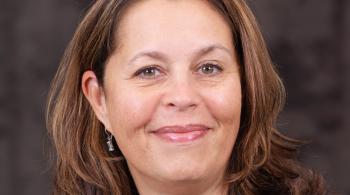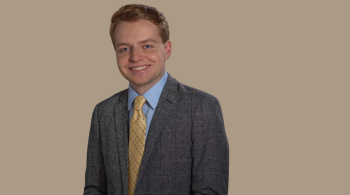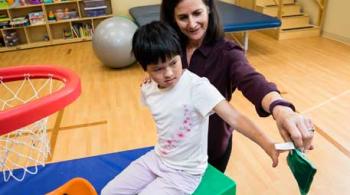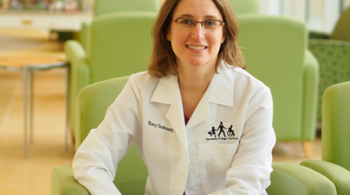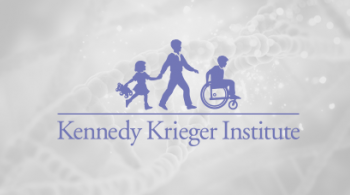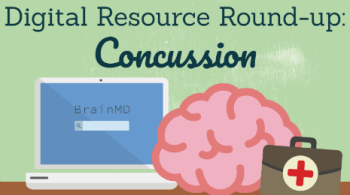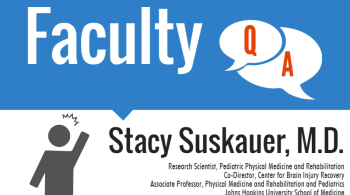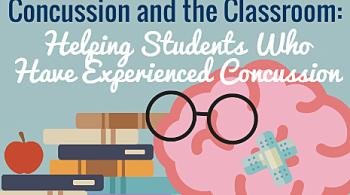Kennedy Krieger's Concussion Clinic treats children and adolescents, assessing patients' best path to optimal recovery and helping them return to academic, athletic and community life.
Concussions are mild brain injuries and are one of the most common injuries following a trauma. Leading causes include sports and recreational injuries, falls and blows to the head. If recognized and treated properly, most people recover fully from a single concussion. However, children and adolescents who sustain multiple concussions tend to take longer to recover each time and are more likely to experience lingering symptoms and lifelong physical, cognitive and psychological problems.
Created more than 25 years ago, Kennedy Krieger Institute's Pediatric Brain Injury Program has been a nationally recognized leader in treating children and adolescents with intensive rehabilitation needs caused by recent neurological injury or illness. Built on the expertise of the brain injury specialists at Kennedy Krieger, the Concussion Clinic was introduced in 2010 to address the needs of those who experience mild traumatic brain injuries and do not need intensive rehabilitation.
The Concussion Clinic treats children and adolescents, ages 2 to 18 years. Treatment and services include checking for overlooked injuries or ongoing problems, assessing patients' best path to optimal recovery and helping them to return to academic, athletic and community life. We also provide education and support for families with questions about their child's return to typical activities.
The clinic also addresses the needs of children and adolescents who sustain moderate to severe injuries, commonly associated with a short hospital stay and discharge to home.
We take an interdisciplinary approach to patient care and strive to quickly evaluate children after a concussion in order to facilitate a return to daily activities, such as school and sports. Our approach includes:
- Diagnosing concussions
- Evaluating for physical, cognitive and emotional symptoms
- Determining when it is safe for athletes to resume play
- Suggesting extra help or support in school, if needed
- Providing follow-up care
During a patient's visit, our team:
- Discusses injury-related symptoms and concerns with the patient and family
- Reviews relevant medical and school records
- Assesses attention, memory, speed and balance
- Develops a treatment plan
At the end of the visit, test results are reviewed with the family and recommendations are provided to facilitate a return to activities. When necessary, follow-up visits and referrals to appropriate programs and providers can be scheduled.
Concussion Symptoms Usually Fall Into Four Categories:
Thinking and Remembering
- Difficulty thinking clearly
- Feeling slowed down
- Difficulty concentrating
- Difficulty remembering new information
Physical
- Headache
- Nausea or vomiting (early on)
- Balance problems
- Dizziness
- Fuzzy or blurry vision
- Feeling tired, having no energy
- Sensitivity to noise or light
Emotional and Mood
- Irritability
- Sadness
- More emotional
- Nervousness or anxiety
Sleep Disturbance
- Sleeping more than usual
- Sleeping less than usual
- Trouble falling asleep
Research Publications:
The Course of Concussion Recovery in Children 6-12 Years of Age: Experience From an Interdisciplinary Rehabilitation Clinic. Risen SR, Reesman J, Yenokyan G, Slomine BS, Suskauer SJ. PM R. 2017 Jan 8. pii: S1934-1482(17)30019-9. doi: 10.1016/j.pmrj.2016.12.005. [Epub ahead of print]
Altered functional connectivity in children with mild to moderate TBI relates to motor control. Risen SR, Barber AD, Mostofsky SH, Suskauer SJ. J Pediatr Rehabil Med. 2015;8(4):309-19. doi: 10.3233/PRM-150349.

